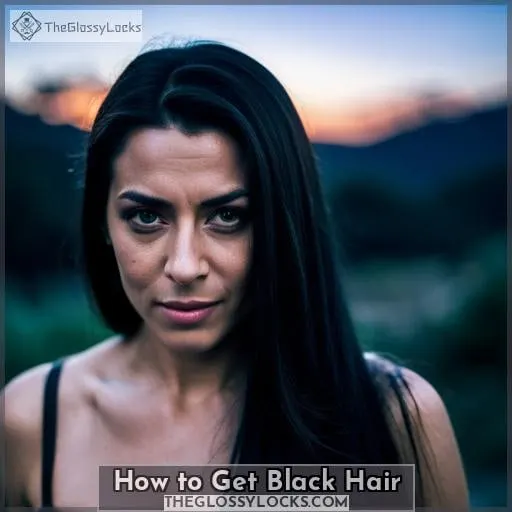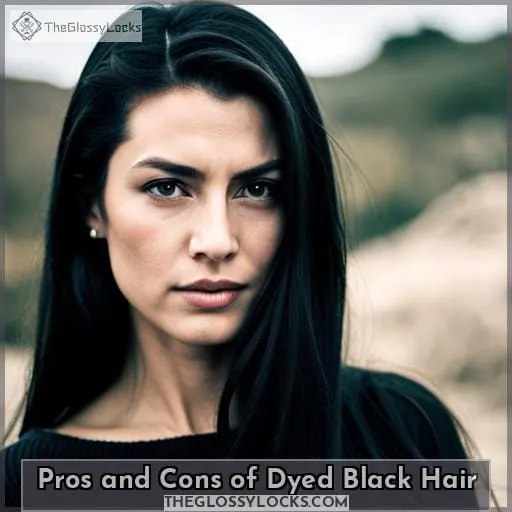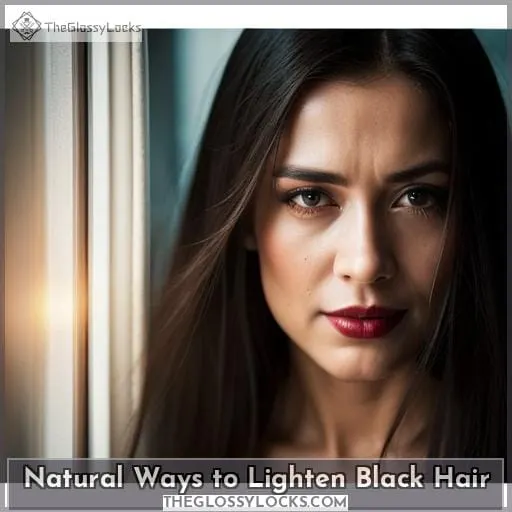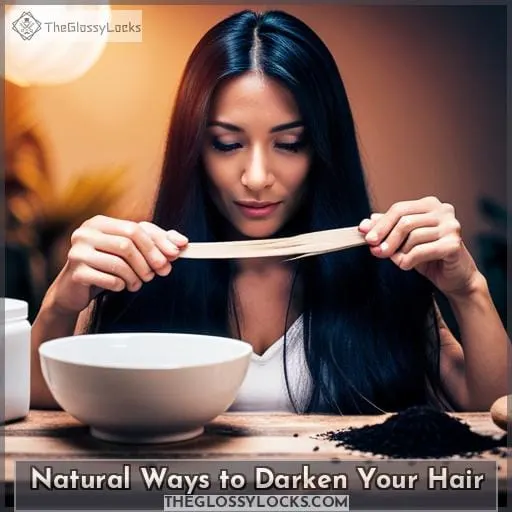This site is supported by our readers. We may earn a commission, at no cost to you, if you purchase through links.
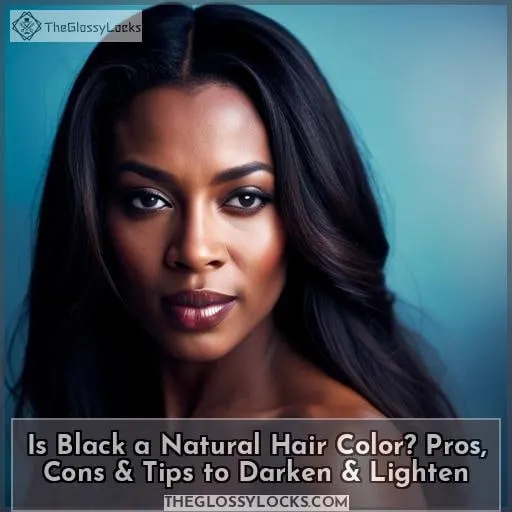
To learn more about this interesting topic, keep reading as we explore what gives us our individual shades and how to get that dark-as-night color without breaking your bank or damaging your locks in the process.
Hair color is determined by melanin pigments, with an excess of eumelanin giving off those signature browns and blacks while pheomelanin leads to fiery red shades.
But don’t worry – there are plenty of safe ways for anyone looking for coal colored tresses like semi-permanent dyes or natural methods such as coffee rinses or lemon juice lightening treatments! So when wondering “is black a natural hair color”, rest assured knowing that although you may not be born with it.
Table Of Contents
Key Takeaways
- Black hair color is determined by the presence of excess eumelanin, which is not the natural color for most humans.
- Dyeing black hair can be achieved with semi-permanent, demi-permanent, or permanent dyes, each with different levels of durability and potential damage to the hair.
- Natural dyes such as lemon juice and chamomile tea can be used to safely dye hair, but the resulting color will depend on the individual’s natural hair color.
- Black hair dye can enhance wrinkles and may not be ideal for aging skin, while natural ingredients like lemon juice and chamomile tea can naturally lighten or darken hair with regular use.
Understanding Hair Color Genetics
Understanding the genetics behind hair color helps us to see how melanin production, environmental factors, and even ethnicity can influence our locks – from subtle shifts in shade to dramatic transformations.
Hair color is determined by two main types of pigments: eumelanin (black/brown) and pheomelanin (red). Mutations in the mc1r gene affect melanin production, leading to different shades of hair tone. True black hair requires a higher amount of eumelanin than any other pigment for its darker tones, while gray occurs when there is decreased or absent pigment production due to aging or stressors like sun exposure.
Studies indicate that genetic variants are associated with certain ethnic origins, which further influences graying pattern across individuals.
How to Get Black Hair
If you’re looking to get black hair, the best method is to dye it with either a semi-permanent, demi-permanent, or permanent color. It’s also essential to determine whether to wash your hair before dyeing, as timing is key and can affect the final color result, by considering factors such as pre-dye hair washing. It’s important to understand the differences between these types of dyes and how they affect your hair before choosing one for yourself.
Semi-Permanent Dye
For a true black hue, try semi-permanent dye – it’s totally rad! Darkening hair from dark brown to jet black is best achieved with demi-permanent or permanent dyes. These dyes contain no ammonia and will give you the deepest color possible. Plus, they last longer than semi-permanent dye, which only lasts up to 8 washes.
Here are five tips on how to best get your desired shade of black:
- Prep your hair before application by washing and conditioning.
- Separate your hair into sections for even coverage.
- Use petroleum jelly around your ears and hairline.
- Tone down any brassiness if necessary after coloring.
- Regularly touch up your roots when necessary.
Demi-Permanent or Permanent Dye
Demi-permanent and permanent dyes can provide a long-lasting, vibrant black hue to your locks with proper preparation. Applying petroleum jelly around the hairline protects the skin from dye application.
Color fading is reduced when using these types of colorants; however, touch-ups may be needed to cover roots over time or if the desired look changes frequently.
Pros and Cons of Dyed Black Hair
Deciding to dye your hair black can be a significant decision. It’s important to consider the pros and cons before taking this step. Dyeing your hair black has the potential for dramatic results, especially with the many options available in human hair wigs for black women, such as those from Raquel Welch and Jon Renau popular lace front wigs. Dyeing your hair black has the potential for dramatic results but is not right for everyone.
Knowing what you are getting into will help you make an informed choice about whether or not it is something that would work with your lifestyle and desired look.
Pros
Dyeing your hair black can enhance your natural beauty, giving you a rich and luxurious look.
- Black hair looks thicker and covers grays easily.
- Natural dyes like lemon juice or chamomile tea can be used for safe dyeing without harsh chemicals.
- Dyeing risks are minimized with proper instructions followed thoroughly.
- Hair health is maintained as long as dye safety precautions are taken seriously.
- Natural hair color still shows through when using non-permanent dyes.
Despite popular belief, true black is not a natural human hair color due to the lack of 100% eumelanin levels in individuals, so it must be dyed for the desired effect.
Cons
Although it may look great in the short-term, dyed black hair can cause damage to your strands over time. Environmental factors such as aging and stress can affect the color of your hair, making it difficult for you to keep up with maintenance.
Variants associated with genetics also come into play – proteins exclusive to this type of dyeing, like TRP 2, need to be taken into consideration when deciding whether or not black is a natural hair color for you.
What’s more, even though true black only contains brown/red undertones, removing this shade is very hard and requires several rounds of removal followed by possible bleaching.
Natural Ways to Lighten Black Hair
If you want to naturally lighten your black hair, lemon juice, chamomile, and sea salt are all effective methods. Lemon juice can be applied directly to the hair over time for a brightening effect, while chamomile tea can also bring out natural highlights when used as a rinse or mask.
Sea salt mixed with water is an excellent way of achieving sun-kissed locks without sitting in the sun all day. All these natural ingredients provide safe alternatives for those looking to lighten their dark tresses without damage from harsh chemicals.
Lemon Juice
You can bring out your inner glow by using a little bit of lemon juice to lighten up those tresses! Using natural ingredients like lemon juice is an easy way to gain subtle highlights. It works with the hair’s natural aging process, affecting melanin production in the hair follicles and pigment pathways.
Lemon juice won’t turn your dark brown or black locks completely blonde, but it will help you achieve lighter tones without damaging genetic variants responsible for true black coloration.
Here are some key benefits of lightening naturally:
- Natural and gentle on strands
- Enhances existing shade gradually
- No harsh chemicals required
Lightening your mane with a simple squeeze of citrus can be just what you need to brighten up any look!
Chamomile
Chamomile tea can give your tresses a subtle lift with its pigment-rich infusion. Its lightening effects help reduce darkening caused by dyeing or aging, and it’s known to have an effect on gray hair based on ethnicity variation.
When applied to damp locks, chamomile reveals highlights from within the natural black hair color for a sun-kissed glow without any harsh chemicals that come with dyeing effects. It’s also been used as an effective alternative treatment for restoring melanin production in some cases of premature graying due to stress or aging factors like UV rays and pollution damage.
The warmth of the tea helps open up cuticles so they can better absorb nutrients needed for healthy growth while simultaneously conditioning them at the same time!
Sea Salt
Mixing sea salt and water creates a solution that can help to lighten your hair, with some people seeing results in just two washes. Studies have shown that up to 80% of users experienced lighter locks. Sun bleaching during hot summer days is also an effective way; the natural UV rays will gradually lighten strands over time due to the salt content in ocean water.
Sea salt treatments are also known for their ability to darken tresses naturally by enhancing melanin production, which gives hair its color pigments, and is also used in various acne skin treatments
.
Natural Ways to Darken Your Hair
If you are looking to darken your hair naturally, two of the most effective methods include using coffee and black tea. Coffee is particularly effective at achieving darker shades on lighter hair as it can penetrate deeply into the shafts.
Black tea contains tannins, which have a darkening effect when applied to damp hair and left in for an extended period of time. Both coffee and black tea take multiple applications before any noticeable change occurs, so be sure to follow up with regular treatments if desired results are not achieved after one application.
Coffee
Brewing up a cup of coffee can give your locks the darkening boost you’re looking for. It’s an easy and natural way to darken hair without any harsh chemicals or potential health risks. Coffee is packed with melanin-forming compounds that penetrate deep into hair shafts, providing subtle color variations depending on brew strength and time left in the hair.
However, it may not be suitable for light blonde shades as fading can occur quickly due to its low level of permanence.
Finally, if you’re after a more dramatic shade of black, then try using semi/demi-permanent dyes instead – just watch out for regular touch-ups!
Black Tea
Black tea can surprisingly darken your locks, just like a cup of midnight coffee. To achieve this, brew black tea and apply it to damp hair for toning results that last longer than semi-permanent dye effects.
The ammonia-free formula removes brassiness without harsh chemicals or bleaching agents while adding long-term care to the strands when used regularly on colored hair, in particular.
Black tea is an easy DIY solution that requires minimal prep time but produces maximum impact color change with no damage done! Your tresses will thank you for using natural ingredients and giving them some extra TLC!
Frequently Asked Questions (FAQs)
Are there any health risks associated with dying hair black?
Dyeing your hair black can come with potential health risks. Make sure to use a quality product and follow the instructions carefully, as some dyes contain harsh chemicals that may irritate the skin or scalp.
Additionally, it is advised to do a patch test before application and avoid contact with the eyes. Seek medical attention if any signs of irritation develop after dyeing your hair black.
How long does black hair dye typically last?
Black hair dye typically lasts for several weeks to months, depending on the type of dye used. Semi-permanent dyes will last a few weeks, while demi-permanent and permanent dyes can last up to 24 washes or longer.
Is there a difference between dyeing and bleaching black hair?
Yes, dyeing and bleaching black hair have different results. Dye adds color to the existing shade of hair without damaging it, while bleach works by lightening your locks and can cause some damage if not done properly.
How often should black hair be dyed to maintain the color?
To maintain a vibrant black hair color, consider professional hair color touch-ups every 4-6 weeks .
, dye it every 4-6 weeks. Use semi- and demi-permanent dyes to avoid damaging your locks. Mix them with a developer for optimal results. Apply petroleum jelly before the process begins for protection.
Can black hair dye be used to lighten hair?
No, black hair dye cannot lighten your hair. Instead, use lemon juice or chamomile tea to naturally brighten. Sea salt and ocean water can also be used for lighter shades of color. To achieve a jet-black hue, you’ll need semi-, demi-, or permanent dyes that penetrate the shaft for longer-lasting results; however, this may not look natural on fair skin tones.
Conclusion
Finally, the answer to the question of whether black is a natural hair color is that it is, but it’s also possible to dye the hair black. The key to achieving beautiful black hair is to understand the genetics of hair color and to use the right products and techniques to get the desired results.
While there are pros and cons to dyeing your hair black, natural methods such as using lemon juice, chamomile, sea salt, coffee, and black tea can help lighten or darken hair color. Ultimately, the decision to dye your hair black should be based on your individual needs and preferences.


